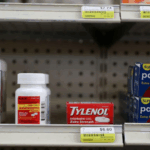
Doctors in the US will soon be advised not to prescribe the pain reliever Tylenol to pregnant women, US President Donald Trump said, citing a disputed link between the drug and autism.
Trump made the announcement on Monday in the Oval Office alongside Health Secretary Robert F Kennedy Jr.
The US president claimed that taking Tylenol, known as paracetamol elsewhere, “is no good” and that pregnant women should only take it in cases of extreme fever.
Some studies have shown a link between pregnant women taking Tylenol and autism, but these findings are inconsistent and inconclusive. Tylenol maker Kenvue has defended the use of the drug in pregnant women.
In a statement to the BBC, it said: “We believe independent, sound science clearly shows that taking acetaminophen does not cause autism. We strongly disagree with any suggestion otherwise and are deeply concerned with the health risk this poses for expecting mothers.”
Aacetaminophen – Tylenol’s active ingredient – is the safest pain reliever option for pregnant women, it added, and without it, women face a dangerous choice between suffering through conditions like fever or using riskier alternatives.
During the announcement on Monday, Kennedy said the Food and Drug Administration (FDA) would issue a physicians notice about what said was the potential risk of taking Tylenol during pregnancy.
He said the FDA will also begin the process of initiating a safety label change on the medication, and that it will issue a public health campaign to spread awareness.
The health secretary added that the FDA will soon approve Leucovorin, a decades-old drug traditionally used to protect cancer patients against toxicity from chemotherapy, to be used as treatment for children with autism.
In April, he pledged “a massive testing and research effort” to determine the cause of autism in five months.
Trump on Monday called the rise in reported autism cases a “horrible crisis,” and an issue that he has “very strong feelings about.”
But experts have cautioned that finding the causes of autism – a complex syndrome that has been researched for decades – would not be simple.
The widely held view of researchers is that there is no single cause of autism, which is thought to be the result of a complex mix of genetic and environmental factors.
The American College of Obstetrics and Gynaecology said doctors across the country have consistently identified Tylenol as one of the only safe pain relievers for pregnant women.
“Studies that have been conducted in the past show no clear evidence that proves a direct relationship between the prudent use of acetaminophen during any trimester and fetal developmental issues,” the group has said.
The drug is recommended by other major medical groups as well as other governments around the world.
In August, a review of research led by the dean of Harvard University’s Chan School of Public Health found that children may be more likely to develop autism and other neurodevelopmental disorders when exposed to Tylenol during pregnancy.
The researchers argued that some steps should be taken to limit the use of the drug, but said the pain reliever was still important for treating maternal fever and pain, which can also have negative effects on children.
But another study, published in 2024, found no relationship between exposure to Tylenol and autism.
“There is no robust evidence or convincing studies to suggest there is any causal relationship,” said Monique Botha, a professor in social and developmental psychology at Durham University.
Dr Botha added that pain relief for pregnant women was “woefully lacking”, with Tylenol being one of the only safe options for the population.
Autism diagnoses have increased sharply since 2000, and by 2020 the rate among 8-year-olds reached 2.77%, according to the US Centers for Disease Control and Prevention (CDC).
Scientists attribute at least part of the rise to increased awareness of autism and an expanding definition of the disorder. Researchers have also been investigating environmental factors.
In the past, Kennedy has offered debunked theories about the rising rates of autism, blaming vaccines despite a lack of evidence.